Abstract
The molecular mechanisms and genetic changes that lead to the progression of prostate cancer during endocrine therapy are poorly characterized. Here, paired specimens from both untreated primary tumors and from local recurrences were collected from 10 prostate cancer patients treated by conventional androgen deprivation therapy. The genetic progression of the tumors was studied by using interphase fluorescence in situ hybridization and chromosome-specific probes. Six primary tumors (60%) and all ten recurrent tumors were aneuploid by fluorescence in situ hybridization. The recurrent tumors also showed a high degree of chromosome copy number variability from one cell to another. Increased copy number of chromosome X was particularly common in the recurrent tumors. In addition, specific high level amplification of the androgen receptor (AR) gene (Xq12) was detected in three highly aneuploid recurrent tumors. Our findings suggest that hormone-refractory prostate cancers are genetically very complex and show intratumor genetic heterogeneity. Increased copy number of chromosome X and the amplification of the androgen receptor (AR) gene may confer proliferative advantage during androgen deprivation and thus contribute to the development of recurrence.
Full text
PDF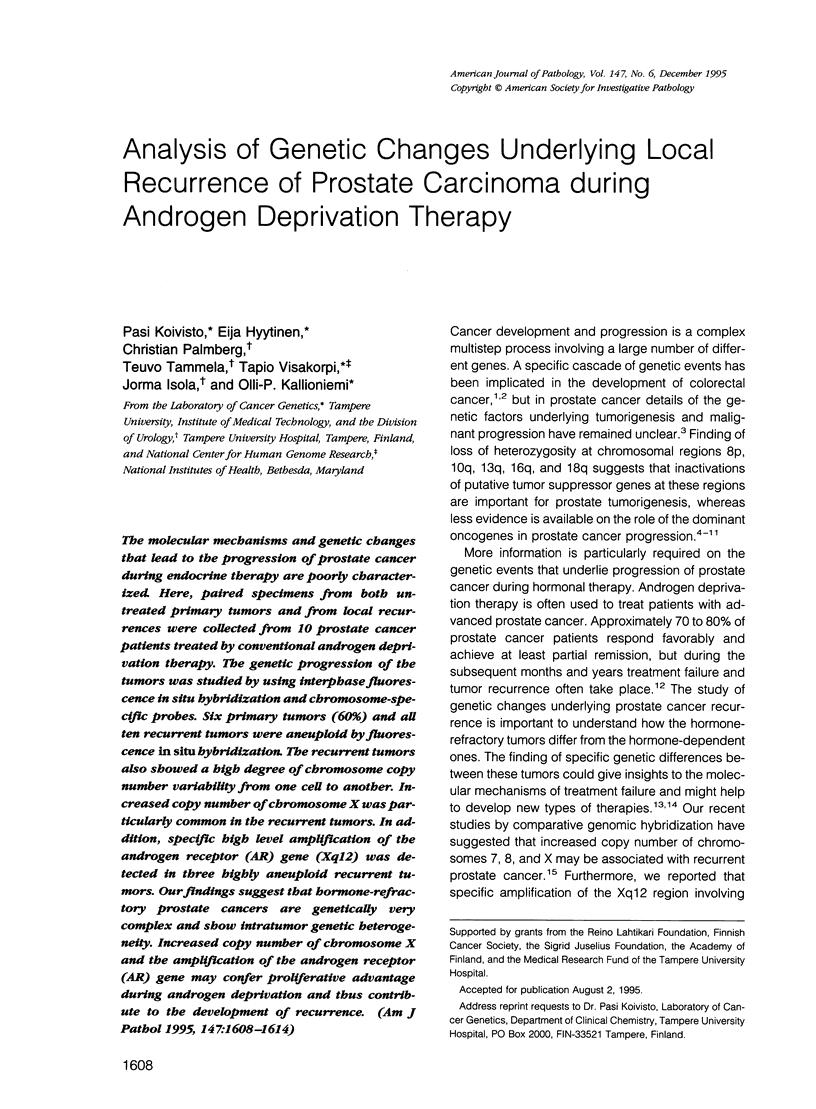
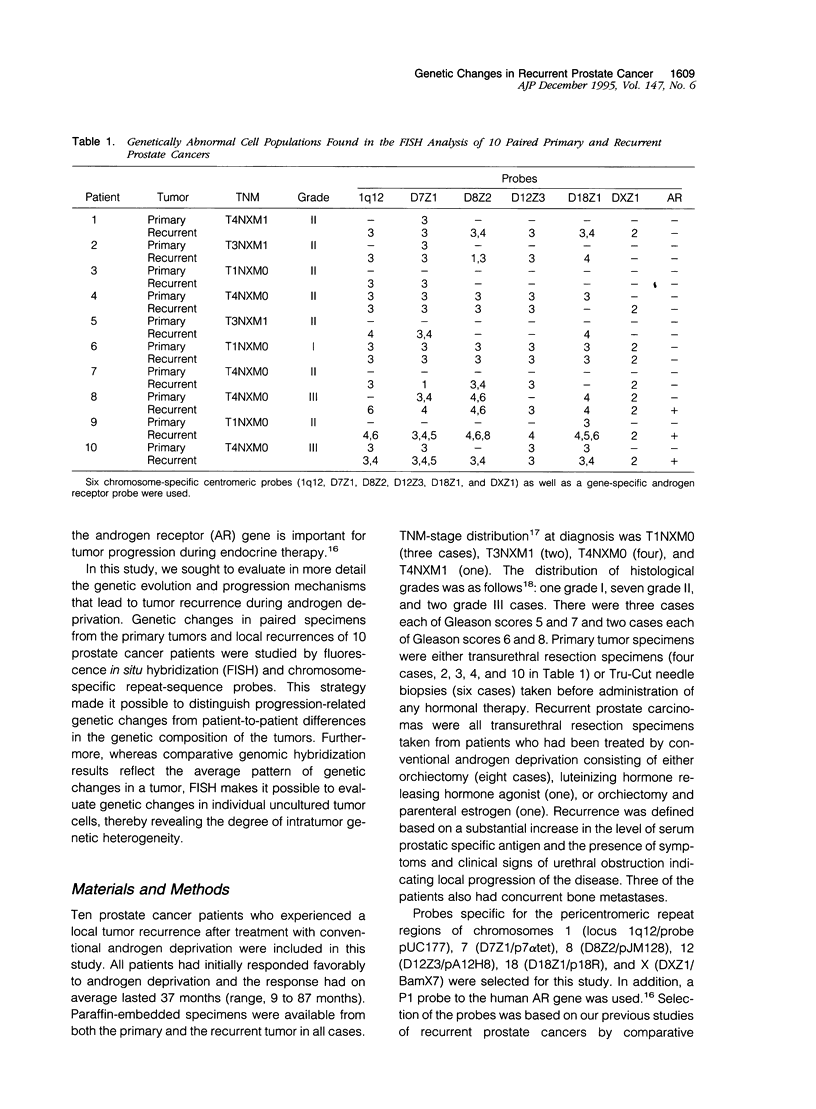
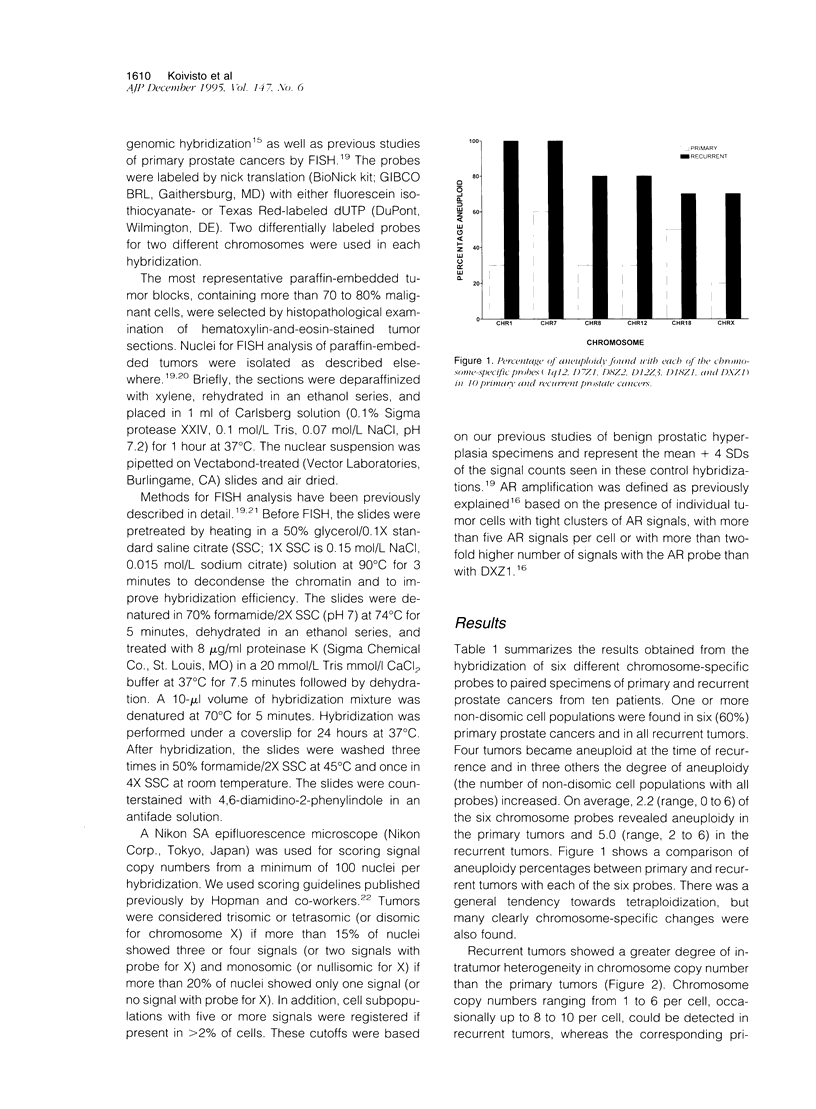
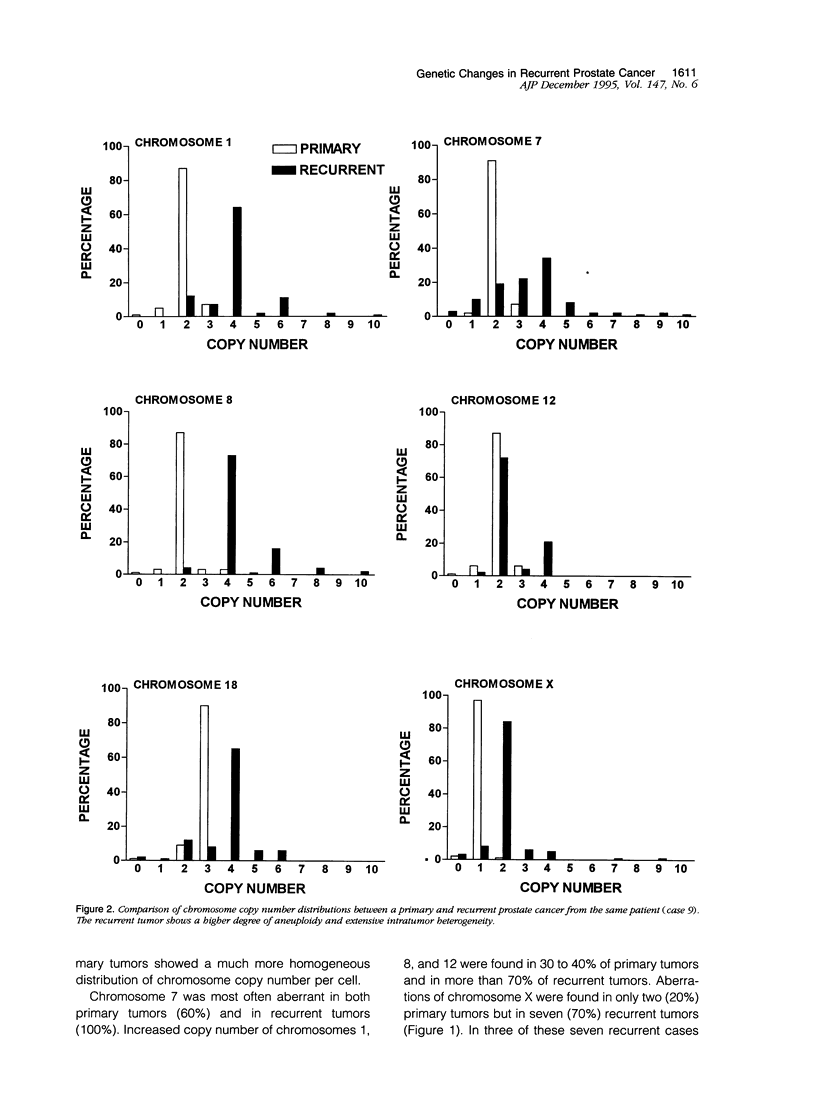
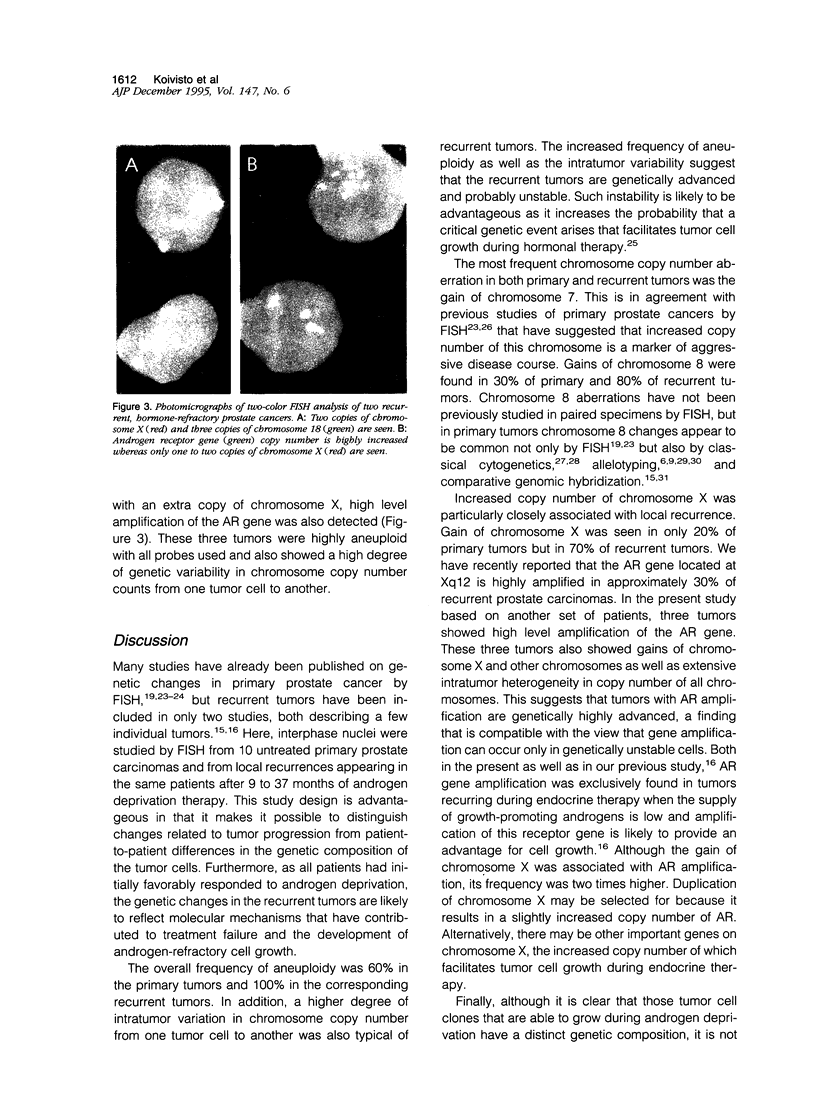
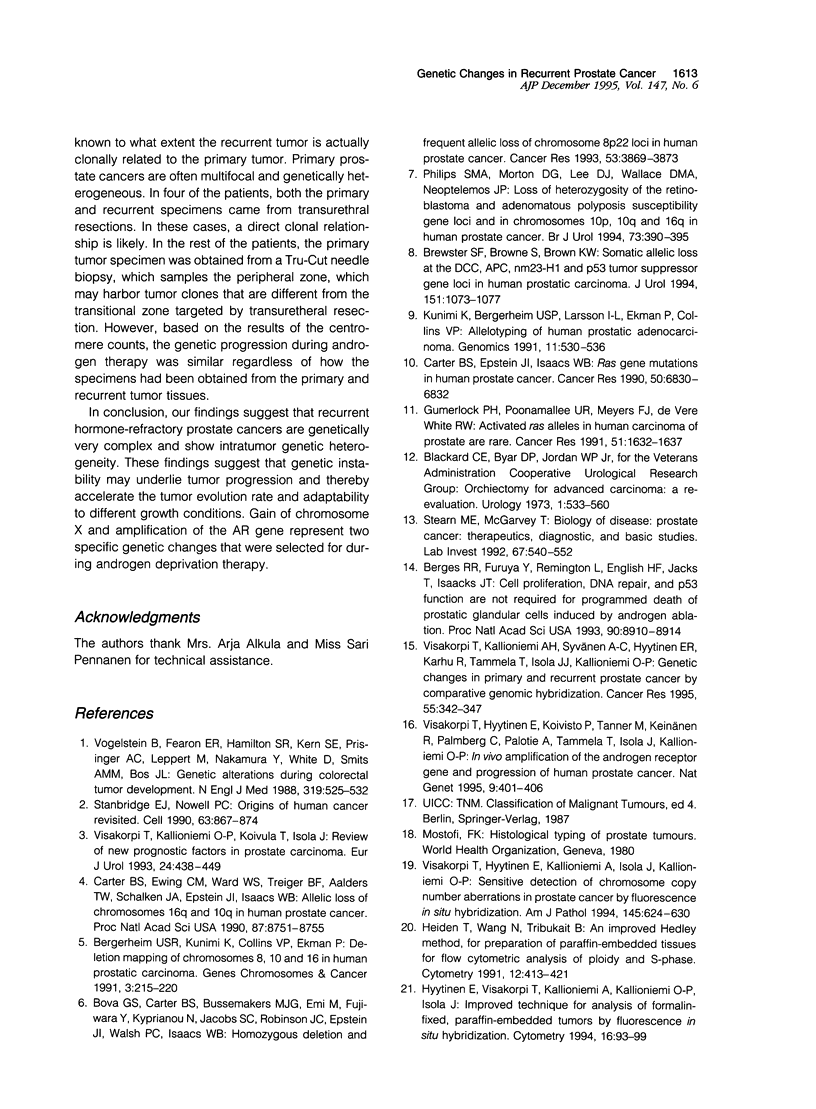
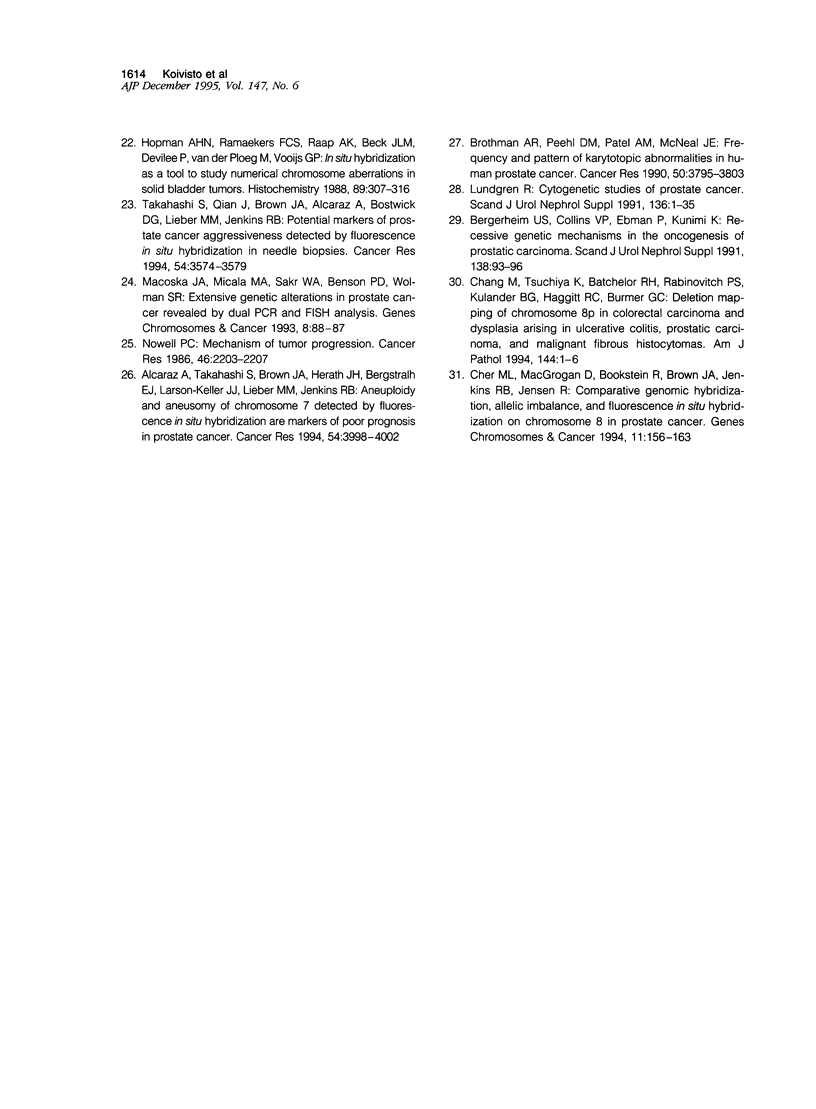
Images in this article
Selected References
These references are in PubMed. This may not be the complete list of references from this article.
- Alcaraz A., Takahashi S., Brown J. A., Herath J. F., Bergstralh E. J., Larson-Keller J. J., Lieber M. M., Jenkins R. B. Aneuploidy and aneusomy of chromosome 7 detected by fluorescence in situ hybridization are markers of poor prognosis in prostate cancer. Cancer Res. 1994 Aug 1;54(15):3998–4002. [PubMed] [Google Scholar]
- Bergerheim U. S., Collins V. P., Ekman P., Kunimi K. Recessive genetic mechanisms in the oncogenesis of prostatic carcinoma. Scand J Urol Nephrol Suppl. 1991;138:93–96. [PubMed] [Google Scholar]
- Bergerheim U. S., Kunimi K., Collins V. P., Ekman P. Deletion mapping of chromosomes 8, 10, and 16 in human prostatic carcinoma. Genes Chromosomes Cancer. 1991 May;3(3):215–220. doi: 10.1002/gcc.2870030308. [DOI] [PubMed] [Google Scholar]
- Berges R. R., Furuya Y., Remington L., English H. F., Jacks T., Isaacs J. T. Cell proliferation, DNA repair, and p53 function are not required for programmed death of prostatic glandular cells induced by androgen ablation. Proc Natl Acad Sci U S A. 1993 Oct 1;90(19):8910–8914. doi: 10.1073/pnas.90.19.8910. [DOI] [PMC free article] [PubMed] [Google Scholar]
- Bova G. S., Carter B. S., Bussemakers M. J., Emi M., Fujiwara Y., Kyprianou N., Jacobs S. C., Robinson J. C., Epstein J. I., Walsh P. C. Homozygous deletion and frequent allelic loss of chromosome 8p22 loci in human prostate cancer. Cancer Res. 1993 Sep 1;53(17):3869–3873. [PubMed] [Google Scholar]
- Brewster S. F., Browne S., Brown K. W. Somatic allelic loss at the DCC, APC, nm23-H1 and p53 tumor suppressor gene loci in human prostatic carcinoma. J Urol. 1994 Apr;151(4):1073–1077. doi: 10.1016/s0022-5347(17)35186-8. [DOI] [PubMed] [Google Scholar]
- Brothman A. R., Peehl D. M., Patel A. M., McNeal J. E. Frequency and pattern of karyotypic abnormalities in human prostate cancer. Cancer Res. 1990 Jun 15;50(12):3795–3803. [PubMed] [Google Scholar]
- Carter B. S., Epstein J. I., Isaacs W. B. ras gene mutations in human prostate cancer. Cancer Res. 1990 Nov 1;50(21):6830–6832. [PubMed] [Google Scholar]
- Carter B. S., Ewing C. M., Ward W. S., Treiger B. F., Aalders T. W., Schalken J. A., Epstein J. I., Isaacs W. B. Allelic loss of chromosomes 16q and 10q in human prostate cancer. Proc Natl Acad Sci U S A. 1990 Nov;87(22):8751–8755. doi: 10.1073/pnas.87.22.8751. [DOI] [PMC free article] [PubMed] [Google Scholar]
- Chang M., Tsuchiya K., Batchelor R. H., Rabinovitch P. S., Kulander B. G., Haggitt R. C., Burmer G. C. Deletion mapping of chromosome 8p in colorectal carcinoma and dysplasia arising in ulcerative colitis, prostatic carcinoma, and malignant fibrous histiocytomas. Am J Pathol. 1994 Jan;144(1):1–6. [PMC free article] [PubMed] [Google Scholar]
- Gumerlock P. H., Poonamallee U. R., Meyers F. J., deVere White R. W. Activated ras alleles in human carcinoma of the prostate are rare. Cancer Res. 1991 Mar 15;51(6):1632–1637. [PubMed] [Google Scholar]
- Hopman A. H., Ramaekers F. C., Raap A. K., Beck J. L., Devilee P., van der Ploeg M., Vooijs G. P. In situ hybridization as a tool to study numerical chromosome aberrations in solid bladder tumors. Histochemistry. 1988;89(4):307–316. doi: 10.1007/BF00500631. [DOI] [PubMed] [Google Scholar]
- Hyytinen E., Visakorpi T., Kallioniemi A., Kallioniemi O. P., Isola J. J. Improved technique for analysis of formalin-fixed, paraffin-embedded tumors by fluorescence in situ hybridization. Cytometry. 1994 Jun 1;16(2):93–99. doi: 10.1002/cyto.990160202. [DOI] [PubMed] [Google Scholar]
- Kallioniemi O. P., Visakorpi T., Holli K., Heikkinen A., Isola J., Koivula T. Improved prognostic impact of S-phase values from paraffin-embedded breast and prostate carcinomas after correcting for nuclear slicing. Cytometry. 1991;12(5):413–421. doi: 10.1002/cyto.990120506. [DOI] [PubMed] [Google Scholar]
- Kunimi K., Bergerheim U. S., Larsson I. L., Ekman P., Collins V. P. Allelotyping of human prostatic adenocarcinoma. Genomics. 1991 Nov;11(3):530–536. doi: 10.1016/0888-7543(91)90059-n. [DOI] [PubMed] [Google Scholar]
- Lundgren R. Cytogenetic studies of prostatic cancer. Scand J Urol Nephrol Suppl. 1991;136:1–35. [PubMed] [Google Scholar]
- Macoska J. A., Micale M. A., Sakr W. A., Benson P. D., Wolman S. R. Extensive genetic alterations in prostate cancer revealed by dual PCR and FISH analysis. Genes Chromosomes Cancer. 1993 Oct;8(2):88–97. doi: 10.1002/gcc.2870080205. [DOI] [PubMed] [Google Scholar]
- Nowell P. C. Mechanisms of tumor progression. Cancer Res. 1986 May;46(5):2203–2207. [PubMed] [Google Scholar]
- Phillips S. M., Morton D. G., Lee S. J., Wallace D. M., Neoptolemos J. P. Loss of heterozygosity of the retinoblastoma and adenomatous polyposis susceptibility gene loci and in chromosomes 10p, 10q and 16q in human prostate cancer. Br J Urol. 1994 Apr;73(4):390–395. doi: 10.1111/j.1464-410x.1994.tb07602.x. [DOI] [PubMed] [Google Scholar]
- Stanbridge E. J., Nowell P. C. Origins of human cancer revisited. Cell. 1990 Nov 30;63(5):867–874. doi: 10.1016/0092-8674(90)90490-6. [DOI] [PubMed] [Google Scholar]
- Stearns M. E., McGarvey T. Prostate cancer: therapeutic, diagnostic, and basic studies. Lab Invest. 1992 Nov;67(5):540–552. [PubMed] [Google Scholar]
- Takahashi S., Qian J., Brown J. A., Alcaraz A., Bostwick D. G., Lieber M. M., Jenkins R. B. Potential markers of prostate cancer aggressiveness detected by fluorescence in situ hybridization in needle biopsies. Cancer Res. 1994 Jul 1;54(13):3574–3579. [PubMed] [Google Scholar]
- Visakorpi T., Hyytinen E., Kallioniemi A., Isola J., Kallioniemi O. P. Sensitive detection of chromosome copy number aberrations in prostate cancer by fluorescence in situ hybridization. Am J Pathol. 1994 Sep;145(3):624–630. [PMC free article] [PubMed] [Google Scholar]
- Visakorpi T., Hyytinen E., Koivisto P., Tanner M., Keinänen R., Palmberg C., Palotie A., Tammela T., Isola J., Kallioniemi O. P. In vivo amplification of the androgen receptor gene and progression of human prostate cancer. Nat Genet. 1995 Apr;9(4):401–406. doi: 10.1038/ng0495-401. [DOI] [PubMed] [Google Scholar]
- Visakorpi T., Kallioniemi A. H., Syvänen A. C., Hyytinen E. R., Karhu R., Tammela T., Isola J. J., Kallioniemi O. P. Genetic changes in primary and recurrent prostate cancer by comparative genomic hybridization. Cancer Res. 1995 Jan 15;55(2):342–347. [PubMed] [Google Scholar]
- Visakorpi T., Kallioniemi O. P., Koivula T., Isola J. New prognostic factors in prostatic carcinoma. Eur Urol. 1993;24(4):438–449. doi: 10.1159/000474347. [DOI] [PubMed] [Google Scholar]
- Vogelstein B., Fearon E. R., Hamilton S. R., Kern S. E., Preisinger A. C., Leppert M., Nakamura Y., White R., Smits A. M., Bos J. L. Genetic alterations during colorectal-tumor development. N Engl J Med. 1988 Sep 1;319(9):525–532. doi: 10.1056/NEJM198809013190901. [DOI] [PubMed] [Google Scholar]



